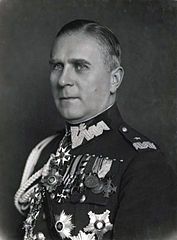He came from a family with a long military tradition and his father Tomasz was an officer in the Austro-Hungarian army. In 1906 he graduated from the Military Technical Academy in Mödling, attaining the rank of second lieutenant as the best student. During World War I, he initially served in Sarajevo, then in Transylvania and on the Russian front. In 1918, after Poland regained independence, he was sent to Branch I, and then to Division III of the Supreme Command. He participated in the fighting along Poland’s eastern borders, being a participant in the Kiev expedition and the defence of Warsaw as part of the Polish-Soviet War. During this conflict he served in the headquarters of the Central Front. After the Polish victory, he was promoted to join the chief of staff of the 2nd Army at the rank of lieutenant colonel and was awarded the Virtuti Militari Cross for his conduct during the Battle of the Niemen River. After the war, he worked for a short time as a lecturer at the Higher School of General Staff. In 1921 he was sent to the War Council Office, becoming its head in 1924. During the May Coup he supported the legal government, but he did not act against Piłsudski, as a result of which he became he first deputy chief of the General Staff in December 1926. From 1928, he was the head of the Higher Military School - his most famous studies during this period included the Study on the War Opportunities of Germany and Poland (1936), in which he emphasized the need for the modernization of the army in terms of its armoured divisions and the importance of air defence. During the September campaign he was the commander of the “Poznań” Army, he was the commander in the greatest battle of defensive war - the Battle of the Bzura (18-22 September). On 28 September, General Tadeusz Kutrzeba signed the act of capitulation of Warsaw, after which he was sent into German captivity. After the liberation of the German POW camp by the Americans, he went to London where he was offered the position of the Minister of National Defenec which he declined. He participated in the work on the establishment of the Władysław Sikorski Institute in London. He died of an incurable cancer in 1947. Major works: Battle of the Nieman River (September-October 1920) (1926), Kiev Expedition of 1920 (1927), Study on the War Opportunities of Germany and Poland (1936).

